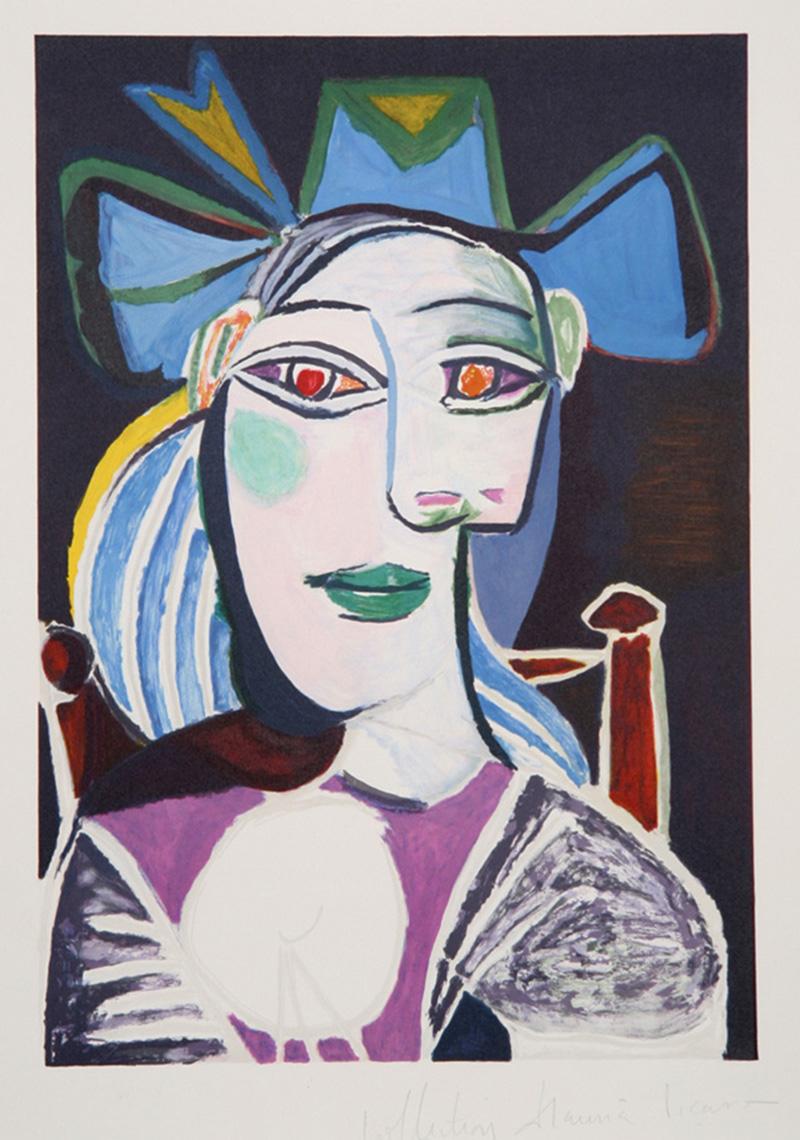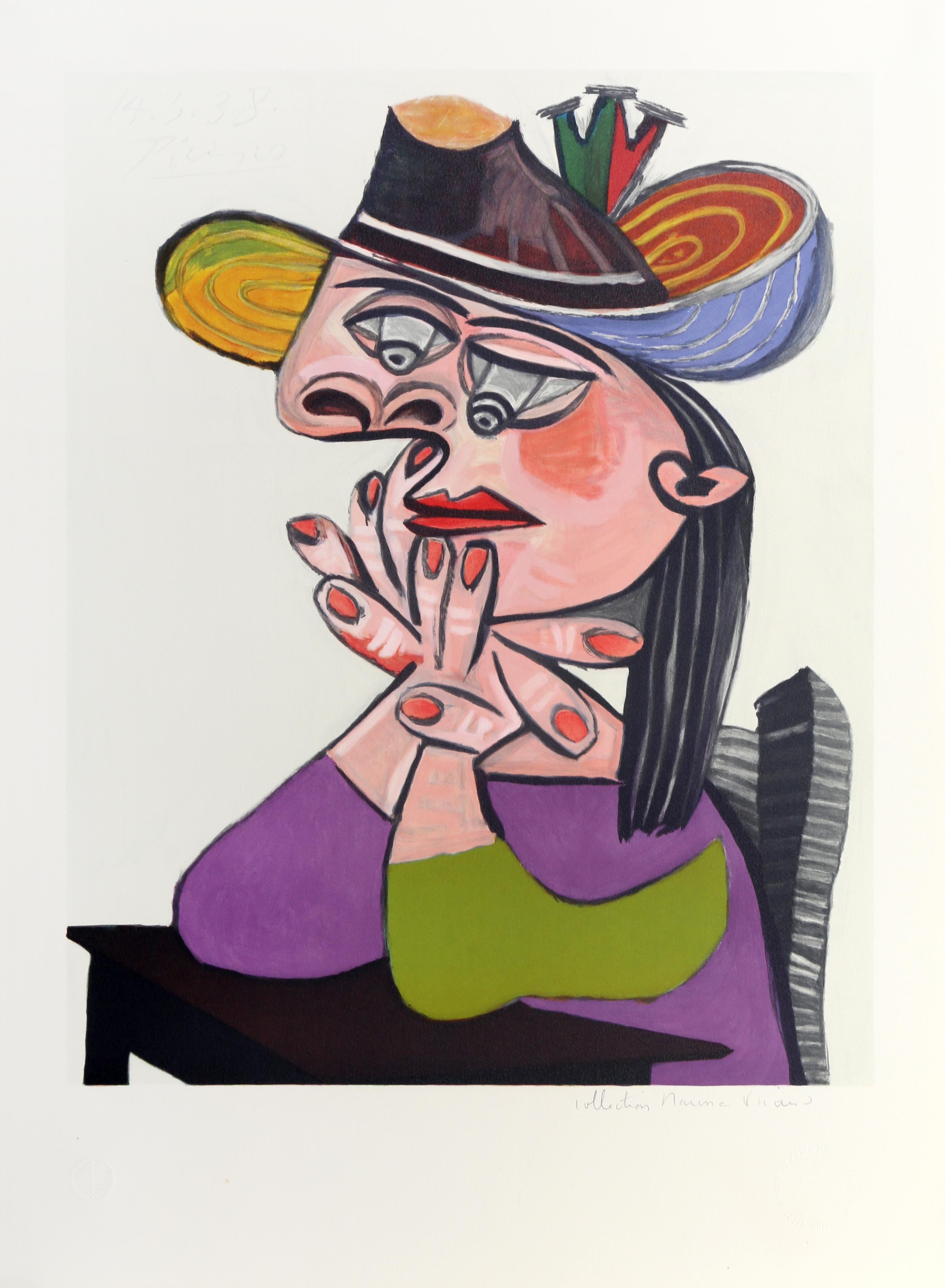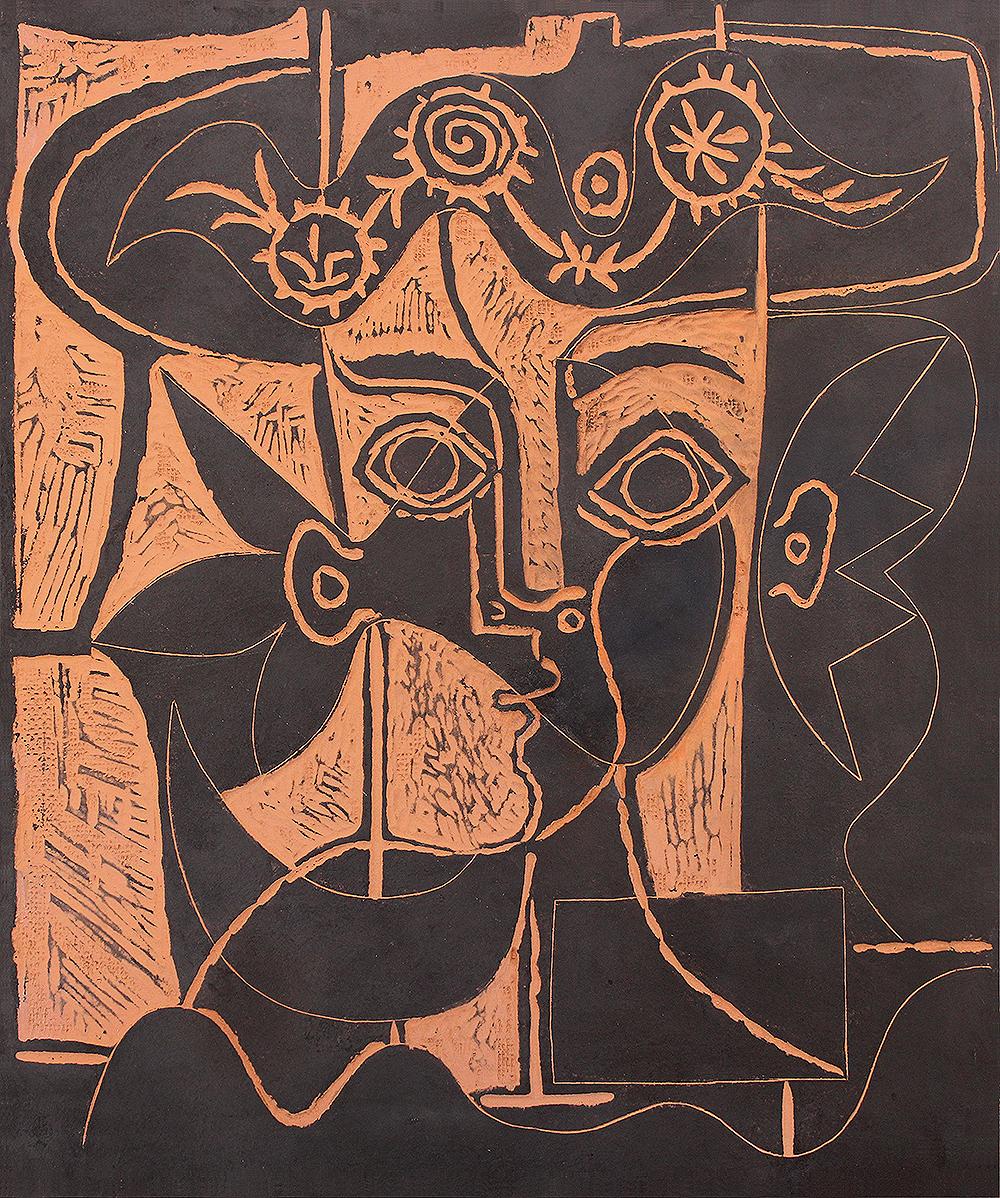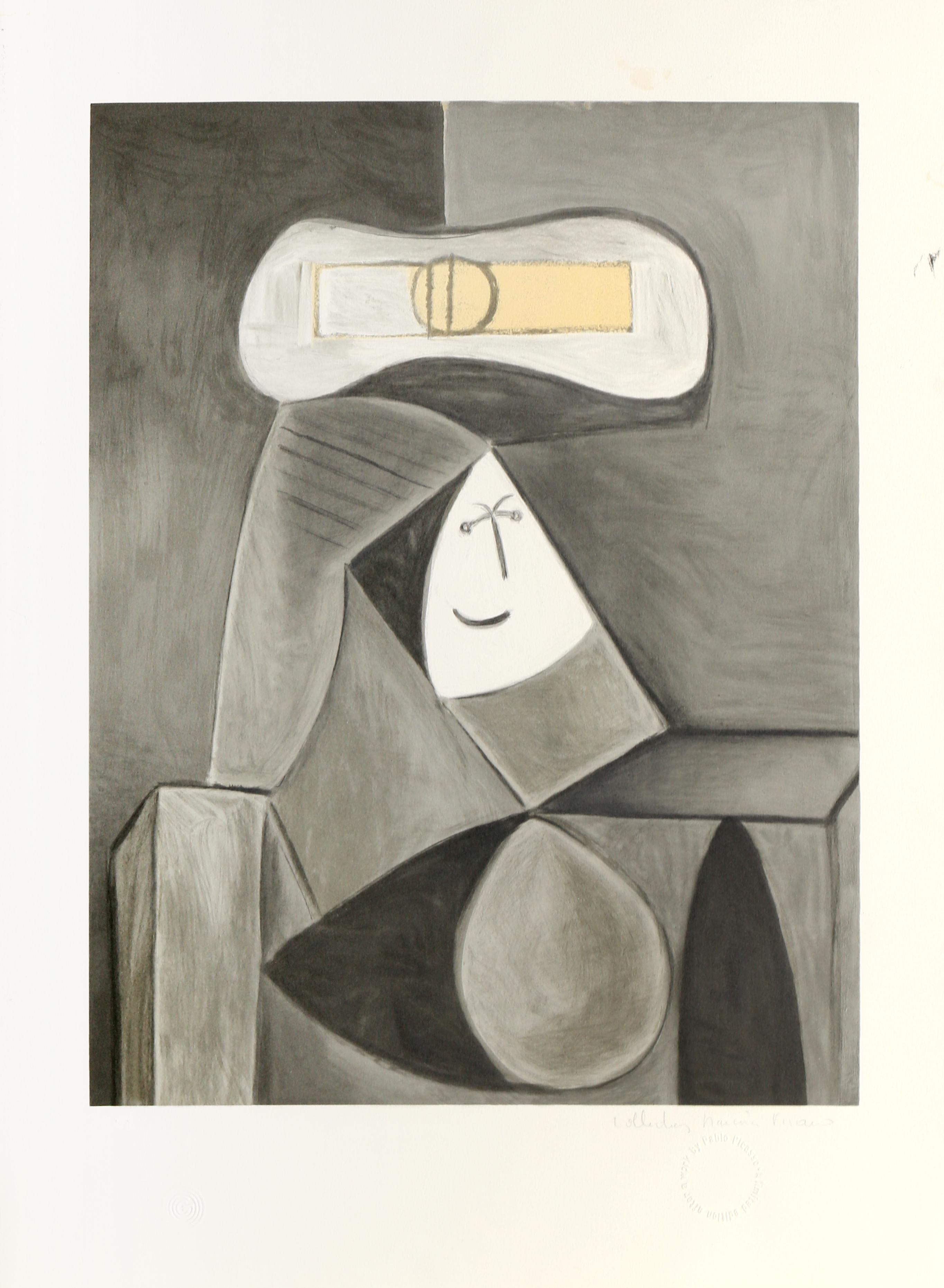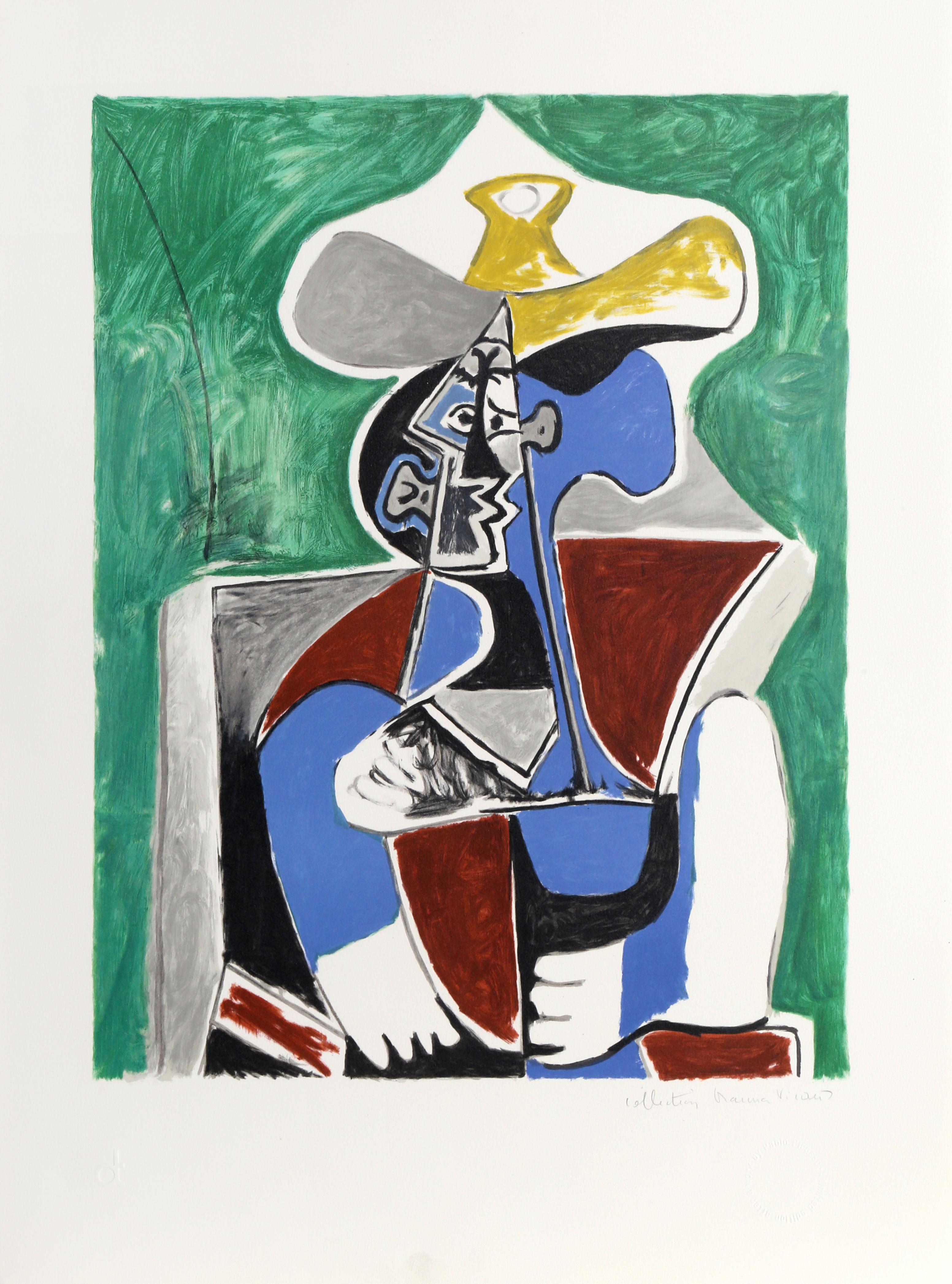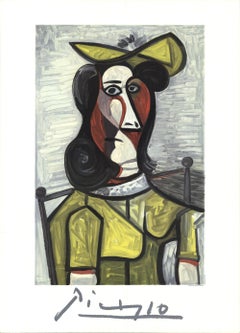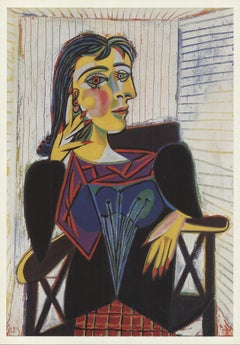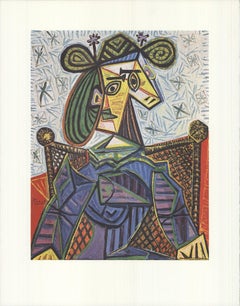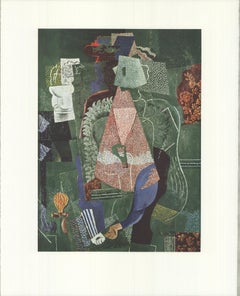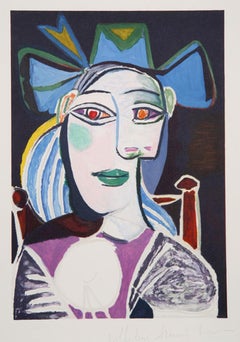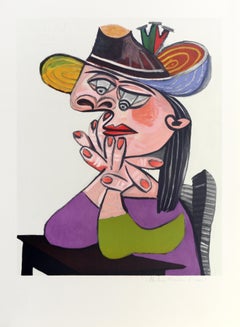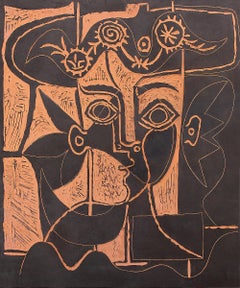Items Similar to Bust of a Woman Wearing a Striped Hat
Want more images or videos?
Request additional images or videos from the seller
1 of 8
Bust of a Woman Wearing a Striped Hat1993
1993
$75
£56.56
€65.41
CA$105.22
A$116.96
CHF 61.31
MX$1,428.41
NOK 765.42
SEK 720.12
DKK 488.21
About the Item
This is a reproduction of Bust of a Woman Wearing a Striped Hat was painted by Pablo Picasso in 1939. This work is from his Surrealist period, during which he explored distorted forms and psychological depth, often reflecting the turmoil of the Spanish Civil War and World War II. Part of his "Taschen Posterbook: Picasso" portfolio, published in 1993 by Taschen and printed in Germany.
Shipping and Handling: We ship worldwide.
Attention International Buyers: Import duties, taxes, and charges are not included in the item price or shipping cost. These charges are the responsibility of the buyer. Please check with your country's customs office to determine any additional costs prior to purchasing.
- Creation Year:1993
- Dimensions:Height: 17 in (43.18 cm)Width: 12 in (30.48 cm)Depth: 0.1 in (2.54 mm)
- Medium:
- Movement & Style:
- After:Pablo Picasso (1881-1973, Spanish)
- Period:
- Framing:Framing Options Available
- Condition:Items are carefully stored and inspected before shipping. Feel free to request additional photos or ask any questions about their condition—we’re happy to assist!
- Gallery Location:Brooklyn, NY
- Reference Number:Seller: YY56371stDibs: LU1294115992632
About the Seller
4.9
Platinum Seller
Premium sellers with a 4.7+ rating and 24-hour response times
Established in 1992
1stDibs seller since 2019
2,558 sales on 1stDibs
Typical response time: 2 hours
- ShippingRetrieving quote...Shipping from: Brooklyn, NY
- Return Policy
Authenticity Guarantee
In the unlikely event there’s an issue with an item’s authenticity, contact us within 1 year for a full refund. DetailsMoney-Back Guarantee
If your item is not as described, is damaged in transit, or does not arrive, contact us within 7 days for a full refund. Details24-Hour Cancellation
You have a 24-hour grace period in which to reconsider your purchase, with no questions asked.Vetted Professional Sellers
Our world-class sellers must adhere to strict standards for service and quality, maintaining the integrity of our listings.Price-Match Guarantee
If you find that a seller listed the same item for a lower price elsewhere, we’ll match it.Trusted Global Delivery
Our best-in-class carrier network provides specialized shipping options worldwide, including custom delivery.More From This Seller
View AllPicasso 'Portrait de Femme au Chapeau et a la Robe Verte' 1982 Lithograph
By Pablo Picasso
Located in Brooklyn, NY
Portrait de Femme au Chapeau et à la Robe Vert Jaune is a lithograph by Pablo Picasso, created in 1982. This limited edition reproduction, sourced from the collection of Picasso’s da...
Category
1980s Cubist Prints and Multiples
Materials
Lithograph
$720 Sale Price
20% Off
Pablo Picasso 'Portrait of Dora Maar' 1993- Cubism Vintage
By Pablo Picasso
Located in Brooklyn, NY
This is a high-quality reproduction of Portrait of Dora Maar, originally painted by Pablo Picasso in 1937 during his Surrealist period. Dora Maar—photographer, painter, poet, and pro...
Category
1990s Cubist Prints and Multiples
Materials
Offset
Picasso 'Woman Sitting in an Armchair' 1990- Vintage
By Pablo Picasso
Located in Brooklyn, NY
Woman Sitting in an Armchair by Pablo Picasso is a high-quality reproduction that captures the essence of the original masterpiece. Printed on 250g paper with deckled edges, this pie...
Category
1990s Cubist Prints and Multiples
Materials
Offset
$200 Sale Price
20% Off
Pablo Picasso 'Portrait De Jeune Fille' 1990- Vintage
By Pablo Picasso
Located in Brooklyn, NY
Portrait de Jeune Fille by Pablo Picasso is a high-quality reproduction that captures the essence of the original masterpiece. Picasso’s Synthetic Cubism period involved the use of v...
Category
1990s Cubist Prints and Multiples
Materials
Offset
$200 Sale Price
20% Off
Pablo Picasso 'Femme Assise Dans Un Fauteuil' 1995- Vintage
By Pablo Picasso
Located in Brooklyn, NY
This high-quality reproduction of Femme Assise Dans Un Fauteuil showcases Picasso’s masterful handling of form and space, capturing the expressive contours and commanding presence of...
Category
1990s Cubist Prints and Multiples
Materials
Offset
Pablo Picasso 'Grand Profile' 1986- Cubism, Vintage
By Pablo Picasso
Located in Brooklyn, NY
Pablo Picasso's Grand Profil is a striking portrait from 1963, capturing the distinctive profile of his second wife and enduring muse, Jacqueline Roque. In this piece, Picasso’s matu...
Category
1980s Cubist Prints and Multiples
Materials
Offset
You May Also Like
Buste de Femme au Chapeau Bleu, Cubist Lithograph After Pablo Picasso
By Pablo Picasso
Located in Long Island City, NY
Set against a flat black background, the female figure in this Pablo Picasso print appears up-close with a detailed view of her face and shoulders. Rendered in the style of Cubism, this work features all of the classic tenents of the style such as differing perspectives and an emphasis on color and shape. A lithograph from the Marina Picasso Estate Collection after the Pablo Picasso painting "Buste de Femme au Chapeau Bleu...
Category
Late 20th Century Cubist Portrait Prints
Materials
Lithograph
Buste de Femme Assise - Les Mains Sous le Menton, Lithograph after Pablo Picasso
By Pablo Picasso
Located in Long Island City, NY
This print by Pablo Picasso portrays a woman wearing a hat in an abstracted, complex form. With her hands clasped underneath her chin and elbows resting on the table before her, the ...
Category
Late 20th Century Cubist Portrait Prints
Materials
Lithograph
Grande Tête De Femme Au Chapeau Orné (Woman’s Big Head with Decked Hat)
By Pablo Picasso
Located in Palo Alto, CA
Created in 1964, this red earthenware clay big rectangular plaque printed with engobe pad is #15 from the edition of 50. This work is stamped with the 'MADOURA PLEIN FEU’ and ‘EMPREINTE ORIGINALE DE PICASSO’ stamps on the reverse.
Pablo Picasso Grande Tête De Femme Au Chapeau Orné (Woman’s Big Head with Decked Hat), 1964 A.R. 518 is a remarkable and beautiful work. It represents Picasso’s most important relationships at the time, namely his artistic partnership with the Ramiés and his romance with Jacqueline Roque. It is also notably one of two ceramic works Picasso has ever made of this scale. Picasso takes immense care in depicting this portrait of his greatest muse Jacqueline; its wonderful texture and delicate variations in line weight are testaments to the artist’s innate creative skill.
Composed of a simple linear carved design in an earth tone clay plaque...
Category
1960s Modern Figurative Sculptures
Materials
Ceramic
Femme au Chapeau, Cubist Lithograph after Pablo Picasso
By Pablo Picasso
Located in Long Island City, NY
Wearing a hat, the woman is represented with a series of black and white shapes that surve alongside one another. Accented by a mustard yellow, the portrait features different perspe...
Category
1980s Cubist Portrait Prints
Materials
Lithograph
Femme Au Chapeau Gris, After Picasso from the Marina Picasso Estate Collection
By Pablo Picasso
Located in Long Island City, NY
This print by Pablo Picasso showcases the artist's changing methods of incorporating Cubism into his portraits of sitters. Colored almost entirely in greyscale, the print contains a ...
Category
Late 20th Century Cubist Abstract Prints
Materials
Lithograph
Buste au Chapeau Jaune et Gris, Cubist Lithograph after Pablo Picasso
By Pablo Picasso
Located in Long Island City, NY
Set against an emerald green background, the figure in this Pablo Picasso print wears a grey and yellow hat. Fragmented into a series of smaller shapes that create various views and ...
Category
Late 20th Century Cubist Portrait Prints
Materials
Lithograph
More Ways To Browse
Taschen Germany
Picasso Woman With Hat
1964 Olympics Poster
American Trotting Horses
H B Warren
Vintage Basset Hound Art
Vintage Stag Prints
Blue Dog Tiffany
Genevieve Antiques
Jennifer Beals
Salvador Dali Elephant
Vintage Jewelry Honolulu
Warhol Cathedral
Warhol Cow
F Hofmann
Francois Langlois
Leopard Lithograph
Pablo Picasso La Pique
